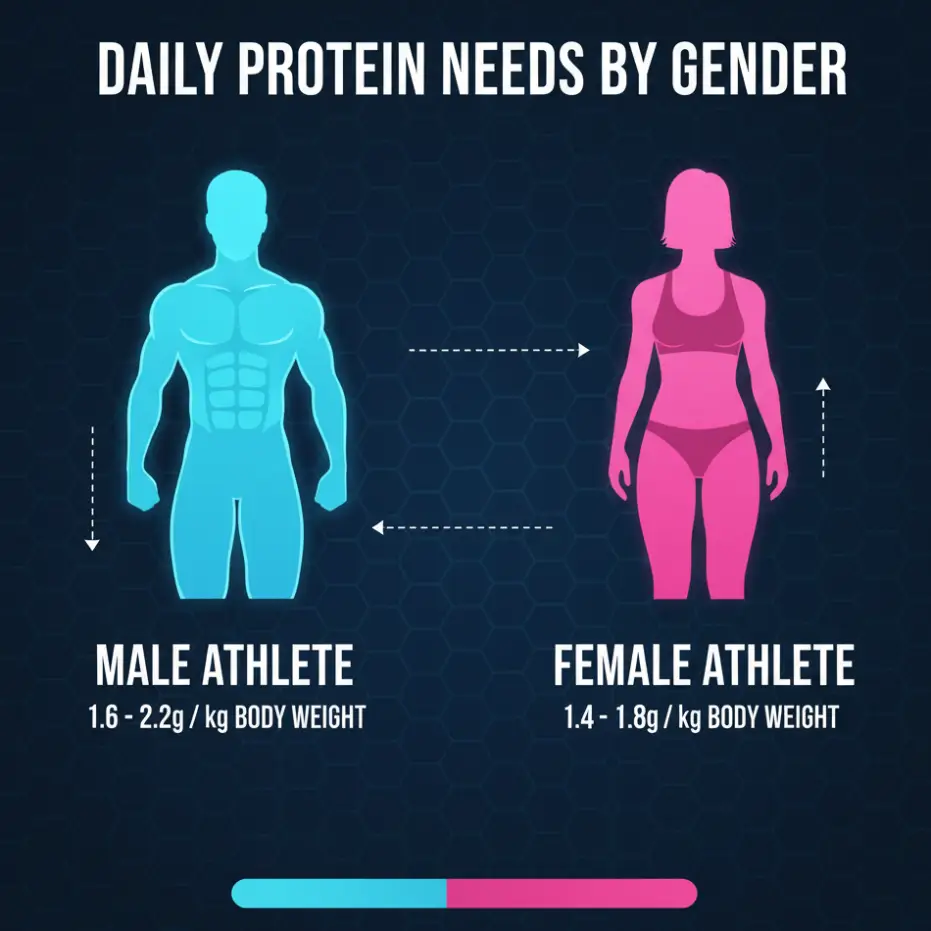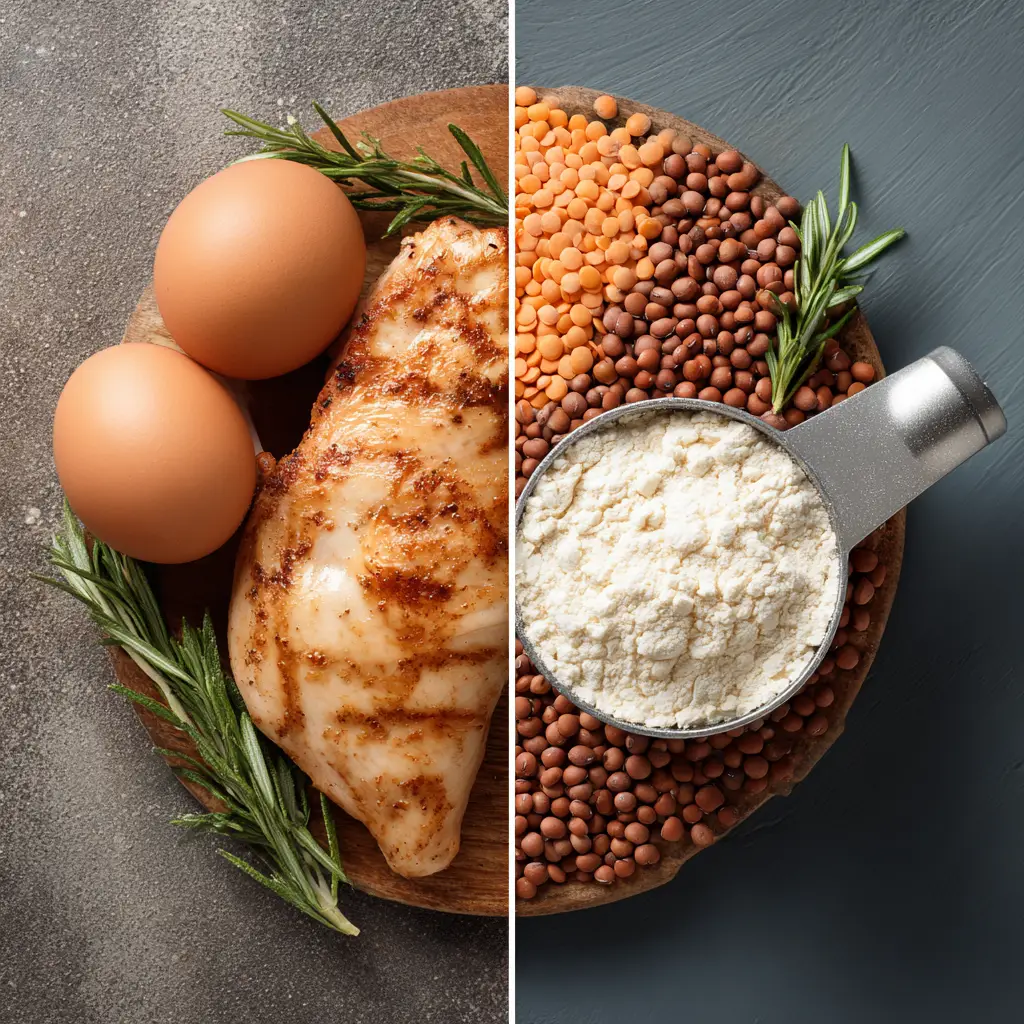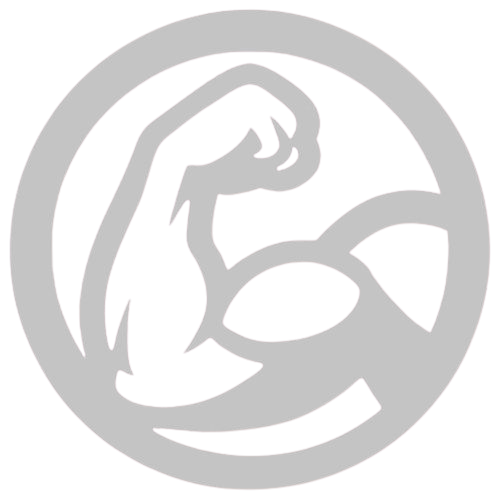Protein supplements for women vs men often spark debate. Some say men need more protein powders, while others claim women need special formulas. The truth is more practical and evidence-based. Men and women share similar protein needs, but body composition and training goals make the difference. In this guide, we break down protein powder for women, protein for female athletes, and the best protein for men without falling for marketing hype.

Table of Contents
Understanding Protein Supplements and Gender Differences
What Are Protein Supplements?
Protein supplements include whey, casein, soy, pea, and blended powders. They help cover daily intake when whole food is not enough. Men often use them to build size and strength. Women frequently look for protein powders for recovery and fat loss. Both benefit equally if the protein quality is high.
Gender Protein Needs Explained
Men generally have more lean body mass, which means their absolute protein requirements are higher. Women often require slightly less protein, but relative to body weight, recommendations are nearly identical. Studies show that both men and women should aim for 1.6–2.2 g of protein per kg of body weight when training.
Protein Powder for Women – Science vs Marketing
Protein Powder for Women
Marketing often paints protein powder for women as lighter or “slimming.” In reality, most are identical to regular whey or plant-based formulas. Some include extra vitamins or collagen, but the protein quality remains the same. For female athletes, the main concern is digestibility and total protein per serving.
What Is a Good Protein Powder for Females?
The best protein powders for females are:
- Whey isolate: high protein, low lactose, fast digestion.
- Pea protein: plant-based, ideal for sensitive stomachs.
- Protein blends: mix of whey and casein for balanced digestion.

Evidence suggests female athletes recover faster with high-quality protein, regardless of whether the label says “for women.”
Protein Powder for Men – Myths and Facts
Best Protein for Men
For men aiming at muscle gain, whey concentrate, whey isolate, and casein remain the top options. Casein is especially effective at night due to slow digestion. The best protein for men depends more on training goal than gender.
Is There a Difference Between Male and Female Protein Powder?
Nutritional breakdowns show almost no difference. Marketing for men emphasizes size and strength, while products for women push weight loss and toning. The formulas are often the same. Men and women can use the same tub of whey or plant protein without issue.
Protein Supplements for Women vs Men
Protein for Female Athletes
Female athletes benefit from protein timing, especially around training. Consuming 20–25 g of protein before or after workouts helps muscle repair. Endurance athletes, such as runners, may require slightly higher protein intake than sedentary women to protect lean mass.
Protein Needs for Men in Training
Men with more lean mass often aim higher in absolute grams. For strength training, 2 g per kg of body weight supports growth. The principle is the same: consistent intake, high-quality sources, and good recovery nutrition.
Protein and Weight Management
Best Protein Powder for Weight Loss Female
Protein supports fat loss by increasing satiety and preserving muscle. Whey isolate and pea protein are ideal because they are low in calories but high in amino acids. Some women prefer blends with added fiber to extend fullness.
Protein for Men and Fat Loss
Protein is equally vital for men in a calorie deficit. It raises the thermic effect of food and keeps metabolism stable during fat loss. Men cutting weight should prioritize protein-rich shakes that avoid excess carbs and sugars.
Side Effects and Safety
Side Effects of Whey Protein for Female
Whey protein side effects for women are mostly digestive: bloating, gas, or lactose discomfort. Claims about whey protein disrupting hormones or causing excessive bulk lack evidence. Safe intake remains under 3 g per kg of body weight per day.
Protein Safety for Men
High protein intake is safe for healthy men. Concerns about kidney strain are not supported by research in athletes with no pre-existing kidney disease. The main risks are poor hydration and reliance on supplements over real food.
Protein Supplements vs Whole Foods
Supplements vs High-Protein Foods
Whole foods like chicken, fish, eggs, and beans provide more micronutrients than powders. However, supplements win in convenience.
html| Protein Source | Protein (per 100g) |
|---|---|
| Chicken breast | 31g |
| Whey protein powder | 80g |
| Lentils | 9g |

See Strongil’s guide on best high protein foods vs supplements.
Timing and Recovery
Protein timing supports muscle recovery. Both men and women benefit from consuming protein within a two-hour window after training. More detail in Protein Timing and Recovery.
Choosing the Right Protein Supplement
How to Read Protein Supplement Labels
Check serving size, protein per scoop, and hidden sugars. Many “female” powders reduce serving size to appear lighter but give less protein. Strongil explains this in How to Read Protein Supplement Labels.
Practical Buying Guide: Men vs Women
- Men aiming for size: whey concentrate or casein.
- Women aiming for fat loss: whey isolate or pea protein.
- Endurance athletes: blends for sustained release.
- Vegans: soy, pea, or rice blends.
Conclusion
Protein supplements for women vs men are more alike than different. The real factor is goal-based intake, not gender. Men may need more total grams due to higher lean mass, but women still thrive on the same powders. Avoid marketing hype, focus on total daily protein, and choose a formula that fits digestion and lifestyle.
For further reading, Strongil guides you through:
FAQs
Best protein powder for men and women?
Whey isolate or plant-based blends work equally for both.
What is a good protein powder for females?
Pea protein, whey isolate, or blends with clean ingredients.
Best protein powder for weight loss female?
Whey isolate or pea protein with low calories.
Side effects of whey protein for female?
Mostly digestive; no evidence of hormonal issues.
Is there a difference between male and female protein powder?
Not really. Most formulas are identical.
Visit my Instagram account for more
